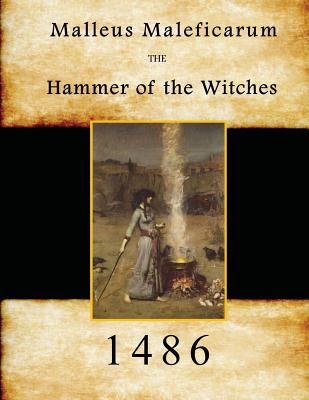Malleus Maleficarum: Hammer of the Witches

Malleus Maleficarum: Hammer of the Witches
Malleus Maleficarum - The Hammer of the Witches - Written in 1486 - By Heinrich Kramer, Translated by Montague Summers - THE COMPLETE ORIGINAL 3 PART ESSENTIAL GUIDE TO THE HUNTING AND QUESTIONING OF WITCHES - Magic, sorcery, and witchcraft - It has been recognized even from the very earliest times, during the first gropings towards the essential conveniences of social decency and social order, that witchcraft is an evil thing, an enemy to light, an ally of the powers of darkness, disruption, and decay. Sometimes, no doubt, primitive communities were obliged to tolerate the witch and her works owing to fear; in other words, witchcraft was a kind of blackmail; but directly Cities were able to to co-ordinate, and it became possible for Society to protect itself, precautions were taken and safeguards were instituted against this curse, this bane whose object seemed to blight all that was fair, all that was just and good, and that was well-appointed and honourable, in a word, whose aim proved to be set up on high the red standard of revolution; to overwhelm religion, existing order, and the comeliness of life in an abyss of anarchy, nihilism, and despair. In his great treatise De Ciutate Dei S. Augustine set forth the theory, or rather the living fact, of the two Cities, the City of God, and the opposing stronghold of all that is not for God, that is to say, of all that is against Him. This seems to be a natural truth which the inspired Doctor has so eloquently demonstrated in his mighty pages, and even before the era of Christianity men recognized the verity, and nations who had never heard the Divine command put into practice the obligation of the Mosaic maxim: Thou shalt not suffer a witch to live. (Vulgate: Maleficos non patieris uiuere. Douay: Wizards thou shalt not suffer to live. Exodus, xxii, 18.) It is true that both in the Greek and in the earlier Roman cults, worships often directly derived from secret and sombre sources, ancient gods, or rather demons, had their awful superstitions and their horrid rites, powers whom men dreaded but out of very terror placated; fanes men loathed but within whose shadowed portals they bent and bowed the knee perforce in trembling fear. Such deities were the Thracian Bendis, whose manifestation was heralded by the howling of her fierce black hounds, and Hecate the terrible "QUeen of the realm of ghosts," as Euripides calls her, and the vampire Mormo and the dark Summanus who at midnight hurled loud thunderbolts a
PRP: 64.74 Lei
Acesta este Pretul Recomandat de Producator. Pretul de vanzare al produsului este afisat mai jos.
58.27Lei
58.27Lei
64.74 LeiIndisponibil
Descrierea produsului
Malleus Maleficarum - The Hammer of the Witches - Written in 1486 - By Heinrich Kramer, Translated by Montague Summers - THE COMPLETE ORIGINAL 3 PART ESSENTIAL GUIDE TO THE HUNTING AND QUESTIONING OF WITCHES - Magic, sorcery, and witchcraft - It has been recognized even from the very earliest times, during the first gropings towards the essential conveniences of social decency and social order, that witchcraft is an evil thing, an enemy to light, an ally of the powers of darkness, disruption, and decay. Sometimes, no doubt, primitive communities were obliged to tolerate the witch and her works owing to fear; in other words, witchcraft was a kind of blackmail; but directly Cities were able to to co-ordinate, and it became possible for Society to protect itself, precautions were taken and safeguards were instituted against this curse, this bane whose object seemed to blight all that was fair, all that was just and good, and that was well-appointed and honourable, in a word, whose aim proved to be set up on high the red standard of revolution; to overwhelm religion, existing order, and the comeliness of life in an abyss of anarchy, nihilism, and despair. In his great treatise De Ciutate Dei S. Augustine set forth the theory, or rather the living fact, of the two Cities, the City of God, and the opposing stronghold of all that is not for God, that is to say, of all that is against Him. This seems to be a natural truth which the inspired Doctor has so eloquently demonstrated in his mighty pages, and even before the era of Christianity men recognized the verity, and nations who had never heard the Divine command put into practice the obligation of the Mosaic maxim: Thou shalt not suffer a witch to live. (Vulgate: Maleficos non patieris uiuere. Douay: Wizards thou shalt not suffer to live. Exodus, xxii, 18.) It is true that both in the Greek and in the earlier Roman cults, worships often directly derived from secret and sombre sources, ancient gods, or rather demons, had their awful superstitions and their horrid rites, powers whom men dreaded but out of very terror placated; fanes men loathed but within whose shadowed portals they bent and bowed the knee perforce in trembling fear. Such deities were the Thracian Bendis, whose manifestation was heralded by the howling of her fierce black hounds, and Hecate the terrible "QUeen of the realm of ghosts," as Euripides calls her, and the vampire Mormo and the dark Summanus who at midnight hurled loud thunderbolts a
Detaliile produsului









